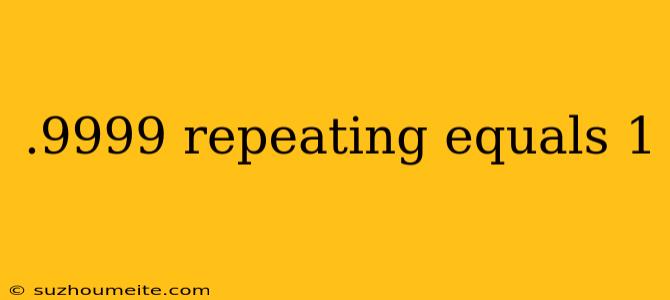.9999 Repeating Equals 1: A Mathematical Conundrum
One of the most counterintuitive and fascinating concepts in mathematics is the idea that .9999 repeating, also known as 0.9 recurring, is equal to 1. This notion seems to defy logic and has sparked intense debates among mathematicians and students alike.
The Notation
Before diving into the proof, let's understand the notation used to represent this repeating decimal. The dot notation is used to indicate that the digits 9 repeat indefinitely. In other words, .9999 represents the following sequence:
0.9 + 0.09 + 0.009 + 0.0009 + ...
The Proof
There are several ways to prove that .9999 repeating equals 1. One popular approach involves using algebraic manipulation.
Method 1: Algebraic Manipulation
Let's start by assuming that .9999 repeating is equal to some value, which we'll call x.
x = 0.9999...
Multiply both sides by 10 to get:
10x = 9.9999...
Now, subtract the original equation from the new one:
10x - x = 9.9999... - 0.9999...
This simplifies to:
9x = 9
Divide both sides by 9:
x = 1
Voilà! We've shown that .9999 repeating equals 1.
Method 2: Geometric Series
Another approach involves using geometric series. A geometric series is an infinite sum of terms, where each term is obtained by multiplying the previous term by a fixed constant.
The series for .9999 repeating is:
0.9 + 0.09 + 0.009 + 0.0009 + ...
This is a geometric series with first term 0.9 and common ratio 0.1. Using the formula for the sum of an infinite geometric series, we get:
Sum = a / (1 - r)
where a is the first term (0.9) and r is the common ratio (0.1).
Plugging in the values, we get:
Sum = 0.9 / (1 - 0.1) Sum = 0.9 / 0.9 Sum = 1
Again, we arrive at the conclusion that .9999 repeating equals 1.
Method 3: Limits
A more advanced approach involves using limits. The idea is to define .9999 repeating as a sequence of partial sums, and then show that the limit of this sequence is 1.
Let's define the sequence as:
S_n = 0.9 + 0.09 + 0.009 + ... + 0.000...9 (n terms)
Using the formula for the sum of a finite geometric series, we get:
S_n = 0.9(1 - 0.1^n) / (1 - 0.1)
Now, take the limit as n approaches infinity:
lim (S_n) = lim [0.9(1 - 0.1^n) / (1 - 0.1)] n → ∞
As n approaches infinity, the term 0.1^n approaches 0. Therefore, the limit simplifies to:
lim (S_n) = 0.9 / (1 - 0.1) lim (S_n) = 1
Once again, we've shown that .9999 repeating equals 1.
Conclusion
The equality .9999 repeating equals 1 is a mathematical fact, supported by multiple proofs and approaches. While it may seem counterintuitive at first, it's a fundamental concept in mathematics that has far-reaching implications in many areas, including calculus, analysis, and number theory.
So, the next time someone says that .9999 repeating is not equal to 1, you can patiently explain the mathematics behind this intriguing concept!
